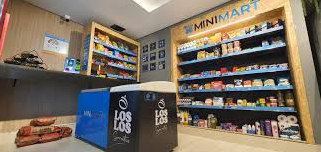Amid inflation and price hikes, minimart owners like Jessie Lim face tough decisions to stay afloat.
SINGAPORE: As residents in Jurong East bustle past Hock Ghee Seng Mart, a small minimart tucked in a busy HDB void deck, shop owner Jessie Lim juggles the daily challenges of running a family business amid rising costs. The shop, often frequented by those in a hurry for a quick purchase, now faces an additional strain: the recent GST hike.
For Jessie, who has managed the business since 2002, taking over from her father and uncle, the increasing cost of supplies and overheads has made it harder to keep prices affordable while staying competitive against supermarkets and e-commerce stores.
With the latest GST increase from 7% to 8% and an anticipated increase in supplier prices, Jessie is seeing the prices of everyday items creep up—like a packet of biscuits that has risen by 60 cents. “Some customers feel the pinch,” Jessie says, “and they let us know. But sometimes, we just can’t absorb all the costs. We have no choice but to pass some of it on.”
The minimart has always been a community staple, serving not only locals but also about 30% of foreign customers, many of whom make frequent trips for their daily purchases. But with the rise of online shopping and supermarkets offering discounts, Jessie fears for the future. “I don’t see myself running this business in five years’ time,” she admits. “It’s becoming harder to compete. Prices are going up, and we’re left trying to keep up.”
Running a minimart, especially in a space that is part retail and part family residence, has always been a balancing act. Jessie’s family lives upstairs, and the space above is utilized for packaging and stock-taking. Despite the long hours and daily grind, she remains committed to the business, though the increasing costs have made it harder to sustain.
The Growing Strain of Rising Costs
With rising utility bills, transportation costs, and the increased GST rate, Jessie finds herself constantly adjusting prices. “We try our best not to pass everything on to the customers,” she explains, “but at some point, we have no choice.” Even basic goods like drinks stored in fridges are becoming more expensive due to rising electricity costs. Despite all this, some of the only relief has been from the CDC vouchers, which Jessie says have helped offset some of the increased costs, saving the minimart from a 20% drop in profits.
Yet, the challenges are far from over. With e-commerce giants and supermarkets continuing to expand their reach, minimarts like Hock Ghee Seng Mart face the possibility of being phased out. “People want convenience, and they’re willing to pay for it,” says Jessie. “It’s tough when you have to compete with bigger stores.”
Adapting to Customer Needs
To stay afloat, Jessie and her team rely on the personal touch of their services. “We can’t compete with the big guys, so we focus on the things we can do better—things like customer service and convenience.” Whether it’s offering off-the-shelf cigarettes, liquor, or rice, Jessie knows her customers’ habits and caters to their immediate needs. It’s a survival strategy that has kept the minimart running despite the increasing competition.
But even this strategy has its limits. With products like tobacco becoming less profitable due to increasing taxes and the rise of alternative products like vapes, Jessie is finding it harder to maintain profit margins. “It’s cheaper to buy vapes from the black market than to buy cigarettes from us,” she notes. “That’s the reality we face.”
The Future of Minimarts in Singapore
As the economy continues to shift and the cost of living remains high, Jessie’s fear that small businesses like hers will eventually become obsolete is shared by many in the industry. While the government offers some relief through measures like the CDC vouchers, the long-term survival of minimarts will depend on more than just temporary assistance.
“The problem is systemic,” Jessie explains. “It’s not just about GST or prices going up. It’s about how much we can absorb and how much we can keep our customers loyal.”
Despite her concerns, Jessie remains hopeful. “It’s a family business. I’m doing this for my family. I want to pass it on to my kids one day, but for now, I’ll just take it day by day.” For now, Jessie’s focus is on keeping the minimart going, doing what she can to help her customers while staying afloat in an increasingly difficult business environment.








